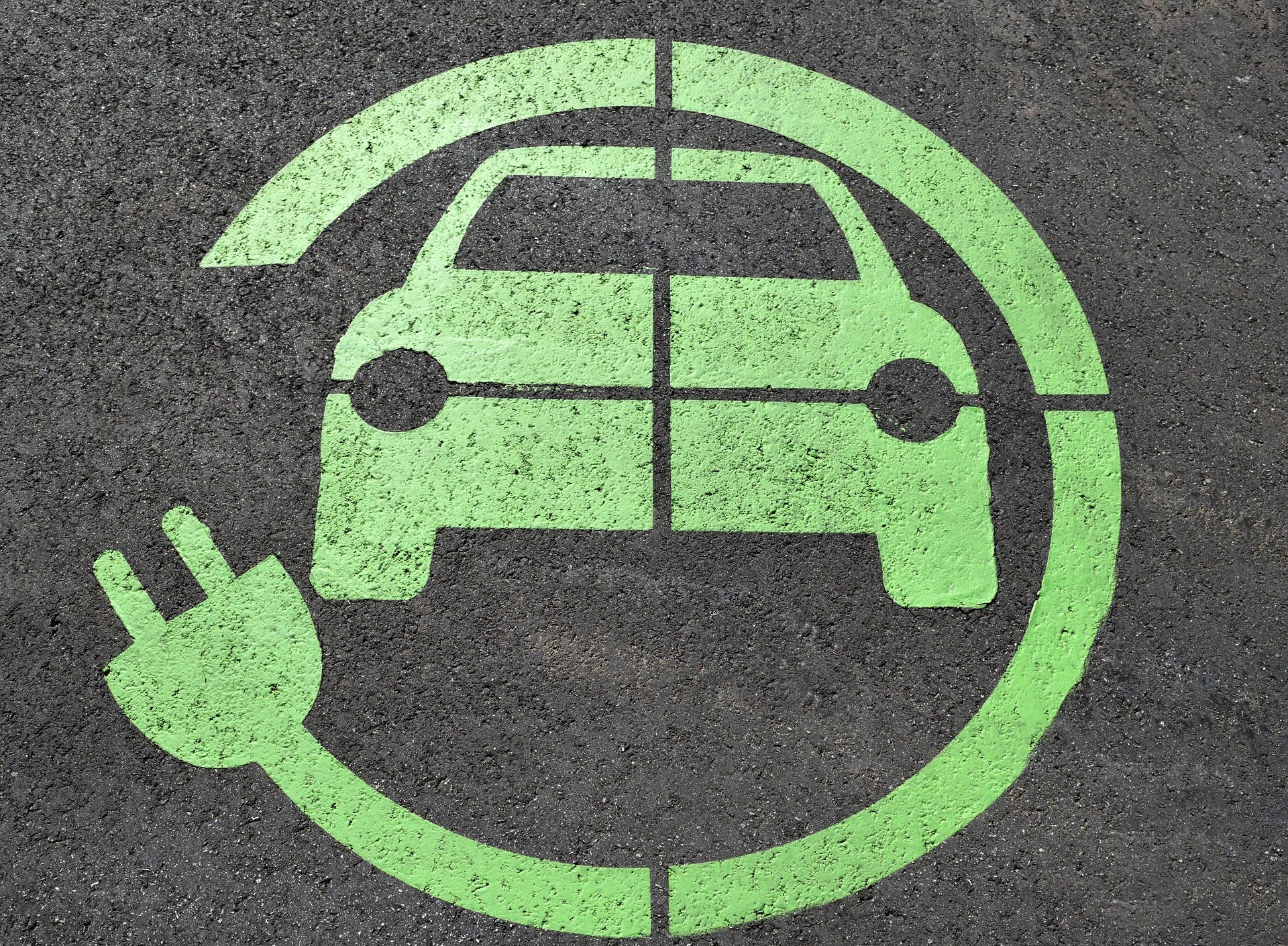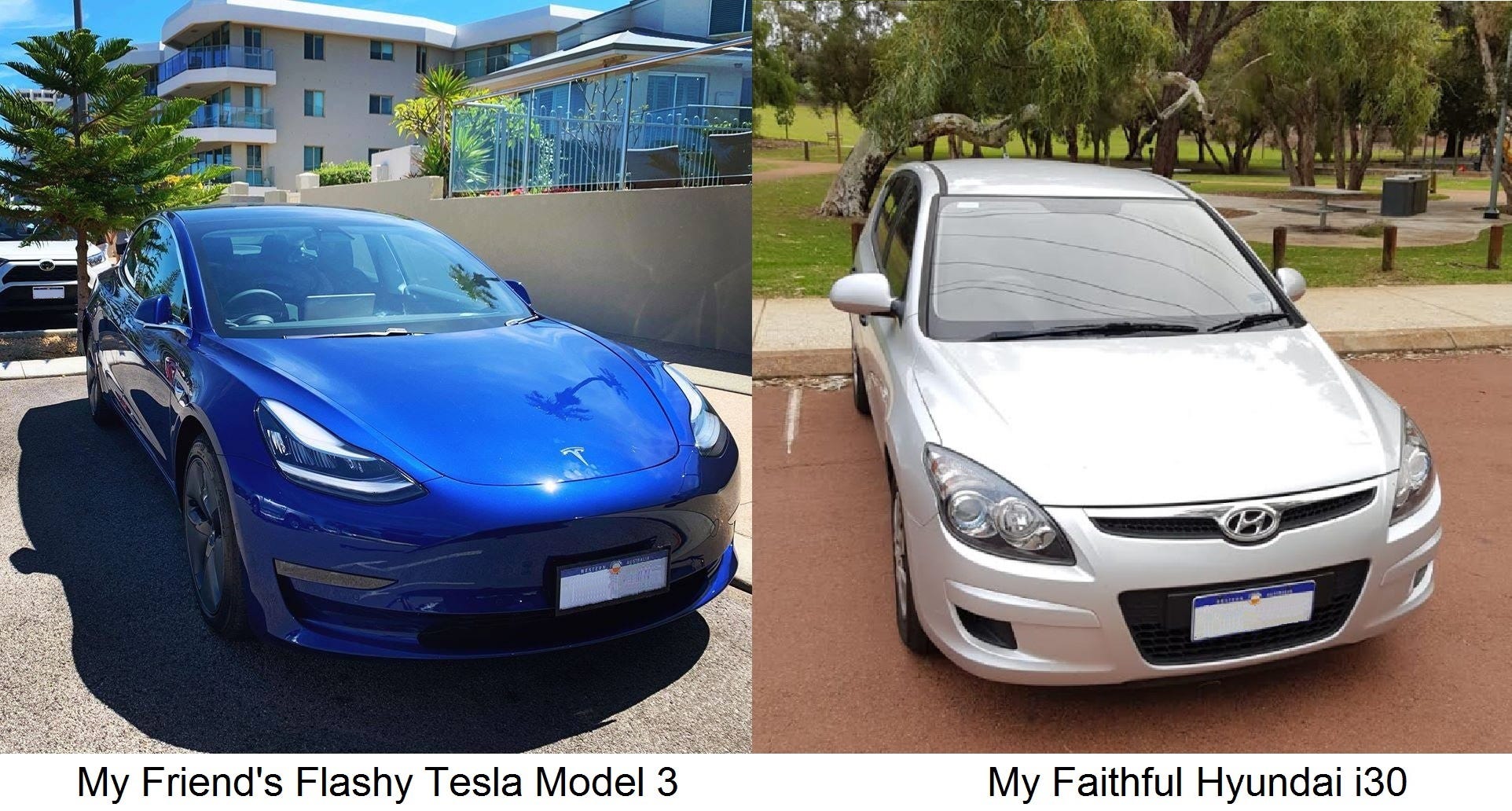Why my next car will be electric / An apology to my friend who bought a Tesla

I live in Western Australia and like the majority of the country, most of the state’s electricity comes from fossil fuels. So when a friend of mine bought a Model 3 Tesla, I was sceptical about the environmental benefits. Sure, it’s a no brainer in a place like Norway or Tasmania where the grid is mostly powered by renewables, but in WA I wasn’t so convinced. After all, if the power that charges the battery comes from fossil fuels, is it really any better than a normal car? In fact, could you argue that the CO2 emitted while producing the battery makes an electric vehicle (EV) worse for the environment? One of the most searched EV related questions on Google is “Are electric cars sustainable?” so I think it’s fair to say many people share my uncertainty about how EVs stack up.
As you’d expect, when my friend rocked up to a party with their shiny new Tesla the group got talking. While we all agreed it was an exceptionally cool car, when it came to the environmental claims the reception was a bit lukewarm. The general feel was that it wasn’t quite worth it — yet — and my friend had jumped the gun. But that feeling wasn’t based on much more than an “I reckon”, so I went out to find some facts.
How big is the footprint, should I be impressed?
IOPScience is an academic journal published by the UK Institute of Physics (IOP). In this article [1] there’s a graph showing the emissions saved by living a ‘car free’ life and not buying an electric car or a regular car. This analysis measures the car’s carbon footprint by including all emissions involved in fuel consumption, fuel production and car manufacture. By comparing the EV and a normal car you get the emission saved by switching. This suggests that in the EU, which has more renewable energy, switching to an EV would save about 1 tonne of CO2 equivalent a year, but in Australia switching only saves 0.2 tonnes a year. The article also provides a rule of thumb on the effectiveness of actions:
- actions which save <0.2t are low impact,
- actions which save 0.2t-0.8t are moderate impact,
- actions that save >0.8t are high impact.
For the purpose of settling the EV debate among my friends I’ll use this as criteria for what makes an action ‘worth it’ environmentally. Something in the high impact category should be carried out sooner rather than later i.e. no guns were jumped, moderate impact actions should happen when existing items need to be replaced and low impact actions are greener but a lukewarm reception is about right. Based on this switching to an EV is on the low to moderate impact cusp, so I wanted a second source.
A second opinion
The Green Vehicle Guide [2] is a resource backed by the Australian Government that helps people who are looking to buy a new car compare environmental performance. Fuel Life Cycle CO2 emissions include emissions from both combusting and producing fuel — but not the car’s manufacture. In a regular car this will cover the emissions from burning fuel and from producing that fuel in the first place. An EV doesn’t burn fuel like a normal car, so its emissions are estimated based on data from the National Greenhouse Accounts which looks at the emission intensity of electricity production in each state. As a comparison I looked up my Hyundai i30 and my friend’s Tesla Model 3. Depending on the exact make and model of the cars being compared there were situations where a Hyundai came out lower — but in most cases the Tesla was the greener option. In our specific case my friend was greener by about 45 g/km. I do about 8000 km/yr so that’s an extra 0.36 tonnes/year I’m emitting. That would make the switch a moderate impact action, but as mentioned this doesn’t look at emissions from manufacturing so the case still isn’t closed.

Third time’s the charm
I found another article [3] published in the scientific journal Nature Sustainability, which considered the life cycle emissions of vehicles including manufacture and grid energy mix over time. These authors examined 59 different regions and found electric cars were better for the climate than conventional cars in 95 % of the world. Their data projects out to 2050 and considers how renewable energy will increase and how technology will improve. Using their data, I made the following graph which shows the Green House Gas (GHG) emissions savings of EVs in Australia over time.

Based on this I would have saved 0.3 tonnes of CO2 by switching to an EV in 2015 and by 2030 I’d be saving 0.53 tonnes. So at this point it seems like we’re in the moderate category and my next car should be electric, but something still isn’t sitting right.
Wait, what are you plugging into?
All three of these sources do their analysis based on the assumption that EV’s are charged from the grid — but is that right? If someone has gone and forked out for an electric vehicle, presumably for environmental reasons, how likely is it that they’re still using our carbon heavy grid to charge it? I stumbled across this article [4] published in TheDriven.io. TheDriven.io is an Australian website for news and analysis about EV’s and while it may not be as scientific as the sources I’ve used so far, it tackles the question “How are EVs charged in Australia?”. The article discusses an informal poll that canvassed about 5% of EV drivers in Australia. The poll found around 75% of EVs get the majority of their charge from renewable sources like household solar panels or purchased renewable energy. This should tip the scales firmly in my friend’s favour but before I re-do my calculation there’s one more thing I want to consider.
Batteries included
The Model 3 batteries are produced in Tesla’s Gigafactory in Nevada which is already part powered by renewables and will be 100% powered by renewable energy once complete. According to this paper [5] by IVL Swedish Environmental Research Institute around 50% of the emissions related to the life cycle footprint of a battery come from manufacturing, as opposed to say mining raw materials or recycling at end of life. This dramatically reduces the Model 3 battery footprint and should make it one of the greenest options on the market.
Doing the maths
So with these two things in mind what does the difference in emissions look like? Let’s say we stick with the data published in Nature Sustainability and assume my car emits something similar to the Australian average, around 358gCO2e/km. Then let’s assume that my friend’s Model 3 Tesla, if it’s powered by renewable energy, is better matched to the data from Norway which is mostly powered by renewables. Then let’s assume that a Tesla Model 3 performs closer to the top 5% of EVs in the Norwegian sample, which would make it’s emissions around 80gCO2e/km (for reference, the Norwegian average is 89gCO2e/km). Redoing my 8000 km/yr calculation, that adds up to a whopping 2.22 tonnes extra of CO2 I’m emitting each year. By my own criteria this makes switching to an EV a high impact action. If any non-Australian readers aren’t feeling the love, I’ve repeated the calculation for a few more countries below.

The final verdict
Even in the most coal intensive places considered, the average electric vehicle has lower emissions and making your next car an EV would reduce your carbon footprint. The case is even stronger if you have solar panels or live in a state like Tasmania, the ACT or SA which has a lot of renewables. This is particularly true if you’re looking at an EV with low manufacturing emissions. Considering my earlier scepticism about my friend’s Tesla, it looks like I owe them an apology: You didn’t jump the gun, my next car will be electric and when we catch up I’ll buy you a drink to toast your reduced carbon footprint.
References:
1. S. Wynes et al. 2017, “The climate mitigation gap: education and government recommendations miss the most effective individual actions”, IOPScience, Environ. Res. Lett. 12 074024, https://iopscience.iop.org/article/10.1088/1748-9326/aa7541
2. Green Vehicle Guide, An Australian Government Initiative, Copyright 2020, Commonwealth of Australia, https://www.greenvehicleguide.gov.au/, accessed 22/05/2020
3. F. Knobloch et al. 2020, “Net emission reductions from electric cars and heat pumps in 59 world regions over time”, Nature Sustainability https://www.nature.com/articles/s41893-020-0488-7
4. B. Schmidt, 2020, “The majority of electric cars in Australia are charged with renewable power”, The Driven, https://thedriven.io/2020/01/21/a-majority-of-electric-cars-in-australia-are-charged-with-renewable-power/
5. M. Romare et al. 2017, “The Life Cycle Energy Consumption and Greenhouse Gas Emissions from Lithium-Ion Batteries”, IVL https://www.ivl.se/download/18.5922281715bdaebede9559/1496046218976/C243+The+life+cycle+energy+consumption+and+CO2+emissions+from+lithium+ion+batteries+.pdf
"electric" - Google News
May 24, 2020 at 04:43PM
https://ift.tt/2XogGFg
The Data Is Finally In: Electric Cars Really Do Produce Less CO2 - Medium
"electric" - Google News
https://ift.tt/2yk35WT
https://ift.tt/3bbj3jq
No comments:
Post a Comment